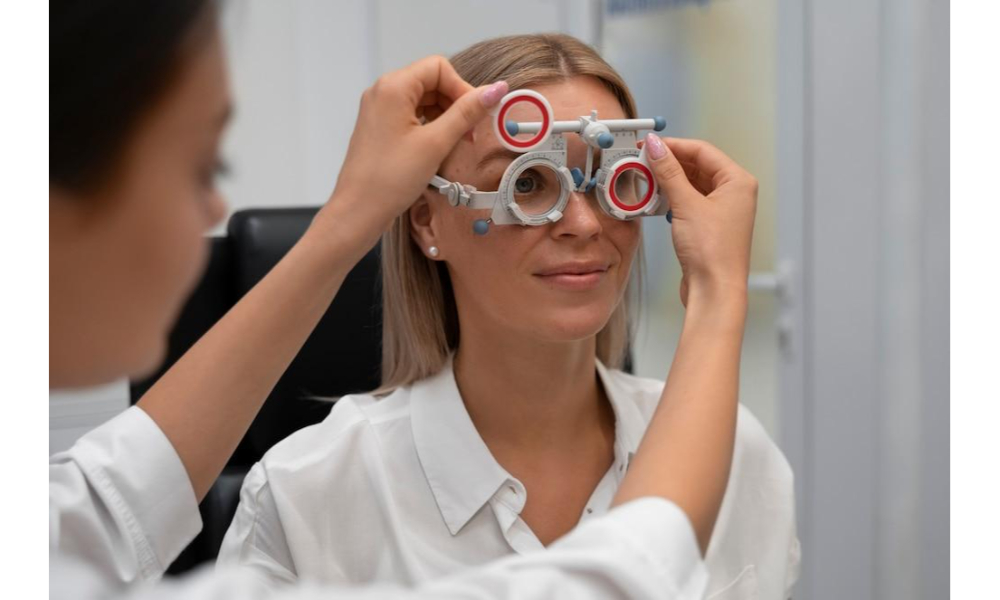Understanding Urgent Eye Care
In today’s fast-paced world, our eyes face constant risks, making urgent eye care essential. From sudden vision changes to injuries or infections, quick treatment can prevent serious complications and protect your sight.
Urgent eye care centers are equipped to handle a variety of non-life-threatening but time-sensitive issues. They also offer relief for acute discomfort, like eye pain or foreign objects, providing fast, effective care and peace of mind.
Knowing when and where to seek urgent care can make all the difference in preserving your vision and eye health.
Common Eye Emergencies Requiring Immediate Attention
Some eye conditions require immediate medical attention to prevent lasting damage. Recognizing these emergencies is key to protecting your vision:
- Eye Injuries: From minor scratches to serious trauma, all eye injuries should be promptly assessed and treated.
- Sudden Vision Loss: A sudden loss of sight in one or both eyes demands urgent evaluation to prevent permanent impairment.
- Severe Eye Pain: Intense pain, especially with redness or swelling, may signal infection or inflammation needing immediate care.
- Chemical Exposure: Quick flushing and professional treatment are essential to minimize damage.
- Retinal Detachment Symptoms: Flashes of light or a shadow in your vision require urgent attention to preserve eyesight.
Timely intervention in these situations is critical for maintaining eye health and function.
When To Visit An Eye Doctor At An Urgent Care Center
Knowing when to visit an eye doctor for urgent care is key to protecting your vision. Seek immediate attention if you experience:
- Persistent Redness or Irritation: This could indicate a serious condition requiring prompt evaluation.
- Foreign Objects in the Eye: Never attempt to remove them yourself—visit an eye doctor to avoid further injury.
- Sudden Vision Changes: Blurriness or double vision may signal serious issues like retinal detachment or even a stroke.
When your regular provider isn’t available, urgent care centers can offer quick diagnosis and treatment to address eye emergencies and prevent lasting damage.
Differences Between Urgent Care And Emergency Room Eye Care
Urgent Care vs. Emergency Room for Eye Issues: What’s the Difference?
Understanding where to go can save time, money, and protect your vision:
Urgent Care Centers
- Treat non-life-threatening eye conditions that need quick attention
- Offer shorter wait times and lower costs
- Open after hours for added convenience
Emergency Rooms
- Handle life-threatening injuries and severe vision problems
- Equipped with specialists and advanced technology
- Best for major trauma, vision loss, or chemical exposure
Bottom line: Choose urgent care for mild to moderate symptoms, and head to the ER for serious or sight-threatening conditions.
What To Expect During Your Visit To An Urgent Care Center
When visiting an urgent care center for eye issues, you’ll complete paperwork detailing your symptoms and medical history. A healthcare provider will then examine your eyes, which may include tests like visual acuity or pupil dilation to diagnose the issue and create a treatment plan.
Before leaving, you’ll receive discharge instructions, prescriptions, and guidance on follow-up care, such as seeing a specialist or returning for further evaluation. Knowing what to expect can help reduce anxiety and make your visit more efficient.
How To Prepare For An Eye Care Emergency
Preparation can greatly improve how you manage an eye care emergency. Familiarize yourself with the location and services of your nearest urgent care center, so you can act quickly when needed.
Keep an updated list of medications and known allergies, as this information helps healthcare providers make informed treatment decisions. It’s also helpful to have a contact list of emergency numbers, including your primary eye care provider and local urgent care centers.
In eye emergencies, staying calm and acting swiftly is key. Whether it’s an injury or sudden vision changes, being prepared can lead to better outcomes and reduce the risk of long-term damage.
Treatment Options Available At Urgent Care For Eye Problems
Urgent care centers are equipped to treat various eye conditions, offering treatments based on your specific needs. Depending on your symptoms, you may receive:
- Medication: Prescription eye drops or oral meds to treat infections, reduce inflammation, or manage pain.
- Foreign Body Removal: If something is stuck in your eye, a provider can safely remove it to prevent further irritation.
- Eye Patching: For corneal abrasions or other injuries, an eye patch may help with healing and comfort.
Other treatments might include flushing your eyes to remove irritants or providing pain relief. The goal is to address symptoms quickly and clearly outline your next steps in care.
Importance Of Timely Eye Care Solutions
Timely eye care is essential to prevent minor issues from becoming major problems. Addressing symptoms early helps protect your vision and avoid complications that may require more intensive treatment.
Ignoring eye symptoms can lead to discomfort and, in some cases, irreversible damage. Untreated infections can spread, and delays in treating injuries may result in scarring or vision loss.
Prioritizing eye care safeguards your vision and enhances your quality of life, as clear, healthy vision is vital for daily activities and overall well-being.
Choosing The Right Urgent Care Center For Eye Issues
Choosing the right urgent care center is key to quality eye care. Look for facilities with a strong reputation, positive reviews, and experience in eye emergencies.
Ensure they have the necessary diagnostic tools or access to eye specialists.
Also consider location, hours, and insurance acceptance to ensure timely, effective care when it’s needed most.
Conclusion: Prioritizing Your Eye Health
In conclusion, understanding and utilizing urgent eye care solutions is a vital aspect of maintaining our overall health. By recognizing when to seek care and choosing the right facility, we can address eye emergencies effectively and minimize the risk of long-term damage.
Prioritizing our eye health involves being proactive in seeking timely care and educating ourselves on the available resources. With the right knowledge and preparation, we can ensure that our vision remains clear and healthy, enabling us to enjoy life to the fullest.



